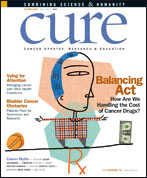A View of Cancer Care in America
Nancy Davenport-Ellis, a breast cancer survivor and founder of the Patient Advocate Foundation, discusses the expense of cancer care for patients and the complexities of health insurance, Medicare, and Medicaid.
Cancer patients today confront cost-shifting burdens from insurers, reduced availability of employer insurance and tiered copayments for services and drugs. Additionally, patients face reduced lifetime caps on health insurance policies and annual caps on services, such as maximum allowable funding for specific tests or treatments, such as radiation. Such complexity often results in a lack of access.
The Patient Advocate Foundation responded to 6.3 million requests from July 2005 through June 2006 from patients, caregivers and healthcare professionals seeking assistance in navigating the healthcare system. We helped reverse insurance coverage denials; negotiate pre-authorizations for complex therapies and/or medication; coordinate benefits between dual health plans covering one patient; negotiate resolutions to medical debt crisis; and mediate complex job retention issues. Seventy-six percent of our patients have health insurance, but they represent underinsured patients who have health insurance that won’t pay for prescribed treatment. Because they are insured, they are often ineligible for public and private assistance.
Complexity in accessing needed pharmaceutical drugs fueled 33 percent of PAF requests for services in 2005. For the 24 percent of PAF patients who were uninsured in 2005, the foundation negotiated free or subsidized drugs through pharmaceutical assistance programs or state Medicaid programs. In that same year, copayment burden resulted in almost 4,000 patients receiving financial support through the PAF Co-Pay Relief program (www.copays.org). Urgency and desperation define the level of trauma these patients are facing.
Oncologists are facing complexities of their own regarding how to provide services in community offices for seniors when the level of drug reimbursement frequently totals less than their cost to purchase the drugs. Many physicians must transfer Medicare patients to hospitals for treatment, resulting in higher costs to the system and personal burden of sometimes daily travel requirements that necessitate a family member or friend to be available for every visit. Frequently, seniors we help simply stop treatment and die of their disease. A 76-year-old Pennsylvania retiree told us he opted out of therapy because of no available caregiver support. A 41-year-old man in New York City contacted PAF as his journey with cancer was ending. He had also stopped therapy with no support available and no financial resources to pay for assistance at home.
While recent Medicare changes to cover prescription drugs for seniors sought to reduce the complexity of drug access for seniors, all stakeholders in the healthcare area must do more. This includes patients, nonprofits, healthcare providers, employers, insurers and government. We must diligently focus on reducing health disparities, solving the uninsured crisis and restoring moral integrity to our nation as we seek to assure sustained access to healthcare for all Americans.
Our vision at PAF is a healthcare delivery system that is available to every person diagnosed with a debilitating illness. Ultimately, our goal is to see a nation that treats every patient as a family member. If we made healthcare decisions as though each decision would be applied to our child, spouse, parent or sibling, the decisions would be compassionate and correct.
So how do we do that with the financial constraints that plague employers, individuals, state and federal health programs? The answer may lie in our nation’s priorities. Together, we have an opportunity to make healthcare a national priority, understanding that we each have a stake in making it work, and we must be willing to personally invest in a successful solution.
—Nancy Davenport-Ennis is a breast cancer survivor and the chief executive officer and founder of the Patient Advocate Foundation (800-532-5274, www.patientadvocate.org) and National Patient Advocate Foundation (202-347-8009, www.npaf.org).
